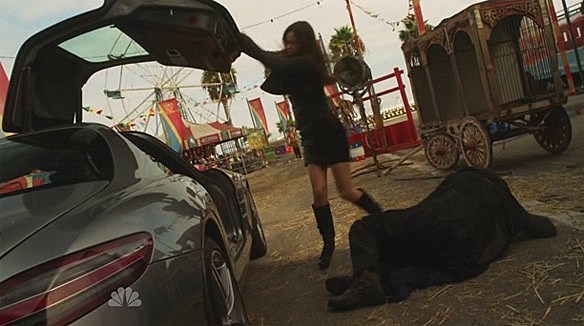
‘The Cape’ Embraces the Ridiculousness of the Superhero Trope

Last week, when NBC was ramping up for their new super-hero show, I told David Uzumeri -- my co-writer for ComicsAlliance's weekly reviews of Smallville's final season -- that we should start doing the same thing with The Cape, with the only difference being that we would refer to every single installment as "The Final Episode."
Seriously, the promos for this thing were so bad that I was convinced it was going to get canceled halfway through the first show. Even beyond the title -- which is so ridiculous that even the show itself has made it a recurring gag -- there was the dodgy special effects and dialogue that was so trite that it almost seemed like parody. But when I sat down on Sunday night to actually watch the show, having lost CA's coin toss, I've got to admit that in a lot of ways, I was pleasantly surprised. If nothing else, The Cape is pretty entertaining, and not in a "so bad it's worth watching" way, either.Well. Most of the time, anyway.
Which isn't to say that it's perfect, or even that it's what I'd refer to as being "very good." In the two episodes that aired as the show's premiere, there are vast sections that are downright terrible, but really, my biggest problem was that it just didn't show me anything new.
For those of you who didn't catch the premiere, it went a little something like this. Palm City is in the grip of a crime wave that's being masterminded by this guy:

A scenery-chewing super-villain named Chess (James Frain), who is essentially this universe's Lex Luthor, and to the show's credit, this is actually a very nice bit of world-building that they were able to pull off very efficiently. Right from the start, we know that this isn't just a TV version of our "real world," but that in the universe of The Cape, there are actual, honest-to-God super-villains going around in masks, threatening to blow up the chief of police and -- I swear this happens -- robbing banks on stilts.
As it turns out, Chess is actually businessman Peter Fleming, who is involved in a plot that should be familiar to anyone who has ever seen RoboCop. Fleming is the head of a private military company called OCP -- sorry, ARK, which capitalizes on the chaos in the wake of Chess's murder of the police chief by making a successful bid to become a fully privatized police force in Palm City.
This doesn't sit well with hero cop Vince Farraday (David Lyons), a hero cop and family man who specializes in looking confused at pretty much everything that happens over the course of the show:

At this point, I can't really say I blame him.
Vince follows a tip from mysterious cyber-rabble-rouser Orwell, and discovers ARK's shady dealings, at which time Chess, in true Republic serial villain fashion, reveals his identity, then staples his mask to Vince's head in order to frame him by making everyone think Vince is the real Chess, and then blow him up on a train.
Except of course that unbeknownst to everyone, Vince doesn't get blown up, and instead manages to find a gang of circus-themed bank robbers who take him in and teach him to be a vigilante by having him choke out a little person.
No, really. I'm not making that part up.

The Carnival of Crime -- which, again, I am not making up, that is the actual name their leader gives to Farraday -- is easily the best part of the show by a long shot. Keith David, whose distinctive he-can-say-anything-and-make-it-sound-amazing voice you might remember from Gargoyles and Mass Effect, plays their leader, an (eeeeevil) escape artist and (criminal) stage magician named Max, and he just revels in the sheer over-the-top silliness of it all.
I mean, this is a character who literally walks over to a pipe organ and plays a dramatic sting when Farraday finds out everyone thinks he's dead, and while that could've easily gone very, very wrong, it actually speaks to the show's greatest strength: It completely, unironically embraces everything that goes along with super-heroes.
I've got a friend who liked the show a lot more than I did, and one of the main reasons that he cited was the fact that while it's very self-aware, it's also sincere. It doesn't take the path that was paved by the mainstream exposure of Watchmen with an attempt to deconstruct super-heroes as a genre, and it doesn't go the opposite route and use them for tongue-in-cheek irony, either. Instead, The Cape does its level best to create a world that, like comics, treats the elements of a super-hero universe as perfectly logical, in their own way.
Of course there's a gang of circus-themed bank robbers called the Carnival of Crime that make their getaways carrying sacks full of cash (that may or may not have giant dollar signs on them). Of course they have a secret headquarters in an abandoned amusement park that for some reason wasn't the first place the cops checked when they heard that there was a gang of circus-themed bank robbers operating in the city. And of course their leader is a master escape artist with a super-awesome crime-fighting cape that is perfectly willing to teach a police officer all his secrets so that he can become a vigilante and fight their mutual foe.
Why wouldn't he?

There's a lot to be said for a show that doesn't waste any time explaining a setup that we're all familiar with before we go in, and like I said, the fact that it does embrace the super-hero genre as much as it does leads to the best stuff. But again, there are flaws that the enthusiasm just doesn't cover.
Max in particular feels very muddled as a character, as though the producers weren't sure if they wanted him to be a sinister badass, a Robin Hood with a heart of gold, or something in between. He goes from ordering his men to kill Vince, cut off his hands and head, and leave his body in the desert so it can't be identified to cheerfully robbing banks in drag to training him in the Batmanesque arts of stealth, fighting and hypnotism in the span of about ten minutes. Admittedly, the threat of decapitation is made while Max is still under the impression that Vince is Chess, but there's no particular reason given for Max -- a robber who seems to have no problem at all with killing -- to have that much animosity for the guy.
Far worse, though, is the character of Farraday himself and the way he arrives at his decision to become a super-hero. For starters, the plot offers up a pretty unconvincing reason for him to not contact his family at all: if his wife knows he's not dead, Chess will find out, uh, somehow, which is up there with "being married would reduce my effectiveness as a crimefighter" as far as lame super-hero excuses for dodging relationships go.
Still, he doesn't want to entirely forsake his family, so he hits on the idea of dressing up as The Cape, his son Trip's favorite super-hero. So Vince Farraday becomes The Cape by dressing up as a fictional super-hero that already exists.

To say the least, this is problematic for a number of reasons, not the least of which being that it leads to a scene where Vince hangs out outside Trip's window at night in costume as The Cape, telling him to mind his mother and do his homework. I actually liked that scene a lot, and I really like the idea of a man becoming a super-hero not so much for vengeance against evil as a desire to make sure that his son won't be alone, but seriously? if the entire premise of your show is that he can't tell his wife he's alive -- or even that his partner, who's hanging around the house and bringing over the occasional casserole, is actually working for the bad guy -- then you can't have him hanging around his son in what basically amounts to a hoodie, giving fatherly advice.
Trip even goes so far as to tell his mother that the Cape is not only real, but told him that his dad was innocent and he was going to prove it. The best case scenario for "my favorite super-hero is real and he hangs out outside my window and also sounds exactly like my father whose body was never recovered" is that she believes him -- or worse, that the crooked partner hears him say so -- in which case we're back to square one. The worst case is that Vince's wife, who is herself dealing with her husband being framed for murder and dying on the same day, thinks her own son has gone completely crazy from the stress, which pretty much ruins both of their lives.
THIS IS A BAD PLAN.
But it's the plan he goes with, although one does wonder what he would've gone with if Max didn't happen to have a super-awesome cape that was "stronger than kevlar, but thinner than a filament" laying around.
At this point, The Cape is basically a low-rent Batman, a fact that's both underscored by the fact that the training montage is essentially the same as the one in Batman Begins but with the ninjas swapped out for the equally comic booky circus folk, and then cemented by the arrival of the last two major players of the series. First up, Scales (Vinnie Jones), who is basically Killer Croc by way of Guy Ritchie.

And that is fantastic.
Scales might as well be fighting Adam West, and I mean that in the best way possible. He even gives the series a traditional deathtrap cliffhanger when, after he punches out the Cape, he decides not to pick up his gun and shoot him, but rather just wrap him up in some chains (no lock) and throw him into the ocean. Of course, the fact that this happens about five minutes after Keith David teaches Vince how to be an escape artist, it doesn't even have the tension of leaving viewers guessing about how the Cape's going to get out of this one.
Secondly, and significantly more disappointing, was Orwell (so called because "Orwell Is Watching You," get it?), who turns out to be Summer Glau:

With her nifty Tony-Starkish computers, Orwell initially functions as the Oracle to the Cape's Batman, but in the second episode, she gets a more expanded role that sees her going undercover as a food critic, which isn't nearly as bad as the first in illustrating the perils of having a walking infodump as one of your characters.
Of course, the tradeoff is that she gets the most illogical moment in the entire show, even by the standards of a super-hero universe. After the Cape has been poisoned, she dumps him at the entrance to the Carnival of Crime's abandoned amusement park, tells Vince that she can't afford to be conspicuous, then walks back around her car in a minidress and high-heeled knee-high boots, then peels out and does a Rockford in her $200,000 Mercedes-Benz SLS.

Again, this is not exactly without precedent in the genre -- Batman, a stealthy creature of the night that some believe is merely an urban legend, drives around a city of ten million people in a car powered by a f---ing jet engine -- but it's another example of how nobody in this show seems capable of figuring anything out until and unless the plot specifically allows them to.
The second episode also lacked anything as outright kooky as the circus training sequence, but it did have a Tarot card-themed assassin who was defeated and tied up in the kitchen of a posh restaurant, with the Cape waiting around until someone walked in to see him do his ninja smoke bomb vanishing trick, so it's pretty much a wash.
Beyond all that, there are some more general problems with the show that mar the experience. For every good bit of dialogue, there'll be a scene like the one where Vince claims something is "my most annoying feature," as though he's reading a description from the back of his action figure, and even the most memorable lines from the show involve way-too-cute jokes about how dumb the name "The Cape" is for Vince's alter-ego.
Similarly, the acting is all over the place. Keith David has the voice, deliver, and sheer presence to say pretty much anything they give him and make it work -- and it's a good thing too, considering some of the goofiness he's saddled with -- but Glau in particular is not very good in the premiere, though it's impossible to tell whether it's her or the material.
But problematic as it was, it was still a much more enjoyable viewing experience than I expected, and it makes sense that NBC would go back to super-heroes in an effort to recreate the success they had with the early days of Heroes. And at this point, it seems like it certainly has the potential to get a lot better, I'd much rather see a super-hero show that embraced the tropes that come with super-heroes than something like Smallville, which spent the better part of a decade being embarrassed about capes and tights to the point where its protagonist stands around not being Superman while guys like Hawkman are running around in full-on San Diego cosplay.
Then again, if I want to see over-the-top characters and unbelievable fights in the time slot they're sticking The Cape with, I could always just turn on Monday Night Raw.
More From ComicsAlliance

![Try To Survive The Vietnam War And More In ‘The Cape: 1969′ #1 [Preview]](http://townsquare.media/site/622/files/2012/06/thecape19691.jpg?w=980&q=75)



![SNL ‘The Cape’ Parody Pretty Much Just Like the Real Show [Video]](http://townsquare.media/site/622/files/2011/01/screen-shot-2011-01-17-at-10.19.12-am.jpg?w=980&q=75)

![NBC Releases Promo Clip for ‘The Cape,’ A Few Cape Wearers Rejoice [Video]](http://townsquare.media/site/622/files/2010/11/screen-shot-2010-11-16-at-2.29.25-pm.png?w=980&q=75)
![Summer Glau’s Supergirl Streaks in New ‘Superman/Batman: Apocalypse’ Clip [Video]](http://townsquare.media/site/622/files/2010/09/supergirlnakedfights.jpg?w=980&q=75)
